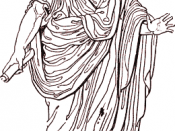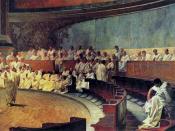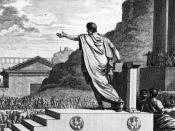At around 500 BC, an Etruscan king named Tarqinius Superbus (Tarquin the Proud) had power in Rome. It was said that he was the most repressive king Rome had ever known. In 509 BC, the Romans overthrew the monarchy and established the republic.
To take the place of the monarchy, the Romans set up a system in which two consuls were elected for a one year term. During their term in office, the consuls had absolute power. Although each consul could issue decrees which had force of law, the other consul could declare the order having no legal force by exclaiming Veto!, or "I forbid."� For the matters which require authorization of the people, it is their business to see to them, to summon meetings, to bring proposals before them, and to carry out the decrees of the popular majority. The two consuls alternated in office each month during times of peace.
During times of war, they alternated each day. When a crisis occurred, the senate and the consuls together could appoint a dictator, who would exercise absolute power for about six months.
The senators served for life and represented the oldest and most prestigious families of Rome. As long as they upheld high standards of conduct, their opinions had the force of law in the Roman republic. The Senate influenced the appointment of military commanders and determined how troops would be drafted into service during times of war. During peacetime, the senate collected taxes and controlled the state treasury. The Senate's role in foreign affairs was to receive foreign ambassadors, and to approve treaties and alliances with other nations. As Rome gained more territory, the senators did not perform all administrative duties themselves, they appointed officials to govern the provinces.
During the early years of the republic, only...


